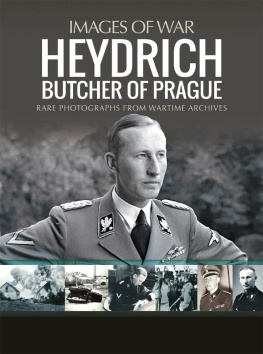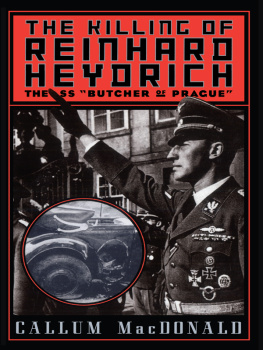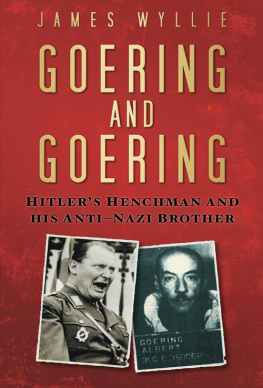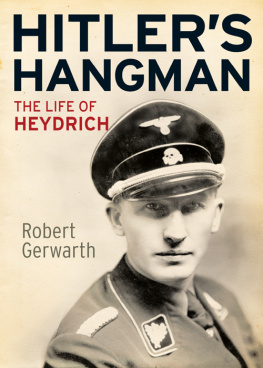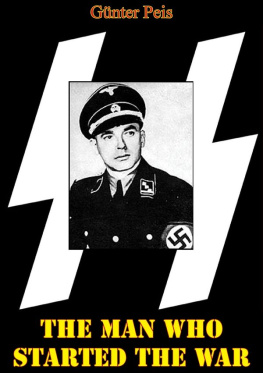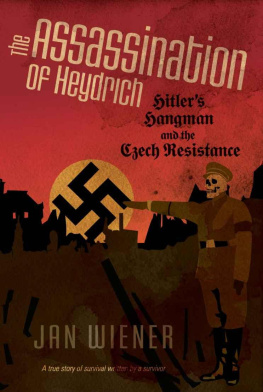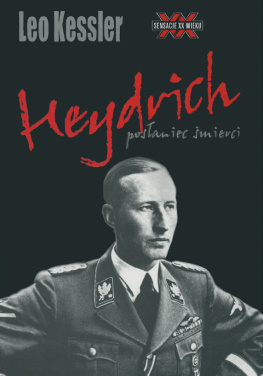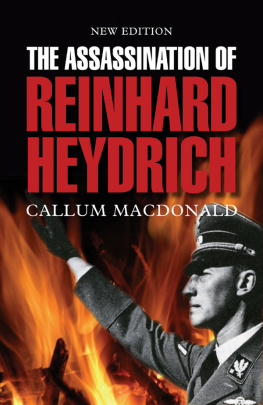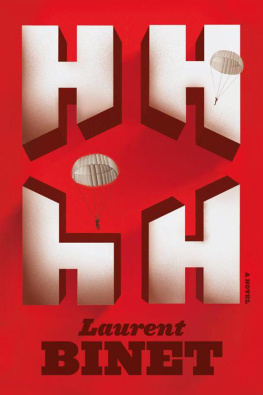
This edition is published by Arcole Publishing www.pp-publishing.com
To join our mailing list for new titles or for issues with our books arcolepublishing@gmail.com
Or on Facebook
Text originally published in 1962 under the same title.
Arcole Publishing 2017, all rights reserved. No part of this publication may be reproduced, stored in a retrieval system or transmitted by any means, electrical, mechanical or otherwise without the written permission of the copyright holder.
Publishers Note
Although in most cases we have retained the Authors original spelling and grammar to authentically reproduce the work of the Author and the original intent of such material, some additional notes and clarifications have been added for the modern readers benefit.
We have also made every effort to include all maps and illustrations of the original edition the limitations of formatting do not allow of including larger maps, we will upload as many of these maps as possible.
HEYDRICH
HITLERS MOST EVIL HENCHMAN
CHARLES WIGHTON
TABLE OF CONTENTS
Contents
TABLE OF CONTENTS
DEDICATION
TO THE PEOPLE OF LIDICE
ILLUSTRATIONS
Heydrich in Vienna, 1938
Heydrich in the courtyard of the Hradcany Castle
Himmler inspects a guard of honour
After the banquet in honour of the Reichsfhrer SSs visit to Prague
Karl Hermann Frank and Baldur von Schirach with Heydrich in Prague
The dead villagers of Lidice and the camera that recorded the scene
The new village of Lidice
The museum at Lidice
The gun carriage bearing Heydrichs body
Heydrich in conversation with President Hacha
The Heydrich memorial in Prague
AUTHORS FOREWORD
WHATEVER the differences which today separate the peoples on either side of the Iron Curtain, one great emotion is shared by allhatred of the Nazi terror which brought death to millions of innocent people.
This book owes its existence to that common emotion which far transcends political divisions, for it is as the result of quite exceptional co-operation and assistance from authorities on both sides of the Iron Curtain that it has been possible to piece together the story of Reinhard Heydrich, the supreme executive of that terror.
Since 1945 the name of Heydrich has become almost a synonym for all that was evil in Nazi Germany, yet the man himself remains one of the great mysteries of the Hitler period. Despite repeated references to him in the post-war memoirs of former Nazis, and other works on Hitlers Germany, little has become known until now of his mind or his motives.
With the capture and trial of Adolf Eichmann in 1960-61 interest in Heydrich revivedas the man behind Eichmann. And the twentieth anniversary of the tragedy of Lidice provides the opportunity to show that Heydrich, in addition to being the master exterminator of the Jews, had been selected by Hitler to liquidate 30,000,000 Slavs.
For the help and co-operation which I have received in preparing this biography of Heydrich I should like to thank the following:
Dr. James Beddie, of the U.S. State Dept., Director of the U.S. Document Centre, Zehlendorff, Berlin, and his staff.
Officials of the British Embassy, Bonn.
The historians of the Bundesarchiv, Koblenz, Germany.
Officials of the Bundespress and Informationsamt, Bonn.
Dr. Anton Hoch and his colleagues of the Institut feur Zeitgeschichte, Munich.
Frau Lina Heydrich, Fehmarn, Schleswig-Holstein.
Dr. Hans-Bernd Gisevius, Berlin-Dahlem.
Herrn Klatte and Spering and their staff in the archives dept. of Der Spiegel, Hamburg.
The Director, World War II Records Division, Alexandra, Va U.S.A.
Mr. David Landor, Director of the Israeli Govt. Press Office, Jerusalem, and Mr. Unna of the Israeli Embassy, London.
Mrs. Wolff and Dr. Kahn of the Wiener Library, London.
Dr. Vaclav Kral, of the Historical Division of the Czech Academy of Sciences, Prague, Czechoslovakia.
Mr. Eduard Klar and his colleagues of the Czechoslovak Foreign Office, Prague.
Mr. Jaromir Johannes of the Czechoslovak Embassy, London.
Mr. John Peet, German Democratic Report, Berlin (East).
Officials of the German Unity Committee, Berlin (East).
INTRODUCTION TWENTY YEARS AFTER
TWO decades have passed since Reinhard Heydrich, chief of the Nazi secret police and Hitlers viceroy in the Czech Protectorate, was assassinated on the orders of the British Secret Service.
On 4 June, 1942 he died from internal injuries received a week earlier when his open car was struck by a bomb thrown in Prague by Czech parachutists dropped from an R.A.F. bomber. The British chose well. At one blow their bomb destroyed one of the three or four key men of the Third Reichand almost certainly the most evil figure in modern history.
Six days later, as a reprisal for the attack on Heydrich, the Czech village of Lidice with all its adult male population was destroyed on the personal order of Adolf Hitler. Its women were scattered through the Nazi concentration camps, where many of them perished. Its children disappearedmost of them for ever.
Lidice had no connection with the attack on Heydrich. It had not sheltered his assailants or given them succour. Its selection was due to nothing more than the muddled confusion of the local Gestapo. To Hitler and the thugs who had survived Heydrich that was unimportant. One Czech village was as good as anotherfor Hitlers aim was to give a final warning to the turbulent Czechs. When on 1 July, 1942 an official report stated that the name of Lidice has been wiped out for ever Hitler believed he had attained his aim.
The atrocity perpetrated amid the pleasant rolling countryside north-west of Prague was, by Nazi standards, on a minor scale compared to the mass extermination plans contrived and launched by Heydrich in the last months of his life. Perhaps 400 men, women and children diedagainst the 6,000,000 Jews exterminated by Heydrichs orders for the Final Solution, and the 30,000,000 Slavs whom he had planned to destroy had he been given the time.
Yet the destruction of Lidice and its people, by grinning SS menrecorded for posterity by Nazi photographers and film cameramenachieved the exact opposite of what Hitler intended. As news of the destruction of the Czech village and its people reached the free world the story of its terrible fate fortified the resolves of free peoples everywhere to fight on until Hitler and Heydrichs henchmen were destroyed.
Lidice shall live Again! The cry taken up by Scots miners a few weeks after the massacre echoed round the world. Villages in far-off landsin Mexico, in the United States and elsewherewere renamed Lidice. And in many countries mothers named their daughters after what had once been an obscure Bohemian mining community. Everywhere on both sides of what is now the Iron Curtain Lidice committees sprang up. Many still exist today, determined that the terrible thing which happened at Lidice shall not be forgotten.
Today Lidice lives again. The Czech Government has built a new model village on the hillside to the west of the mass grave where the men of Lidice lie. The grave with its great cross is a thing of beauty, marked by the enormous rose garden largely created through the efforts of a British committee drawn from every walk of public life in the United Kingdom. Within sight of the grave live the women who survived, with their children and their grand-children who never knew the jackboot of the Nazi oppressor.





